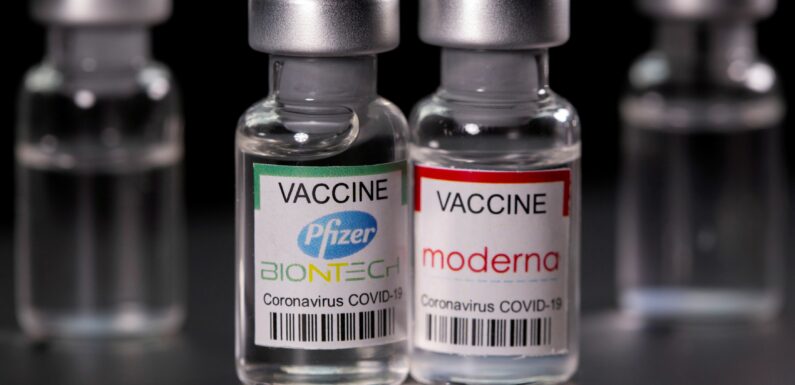
Another preprint study that raises worries about the mRNA antibodies’ viability against Delta — especially Pfizer’s — has effectively commanded the notice of top Biden organization authorities.
What they’re saying: The investigation discovered the Pfizer antibody was just 42% compelling against contamination in July, when the Delta variation was predominant. “In case that is not a reminder, I don’t have the foggiest idea what is,” a senior Biden official told Axios.
Driving the news: The investigation, led by nference and the Mayo Clinic, looked at the adequacy of the Pfizer and Moderna immunizations in the Mayo Clinic Health System over the long run from January to July.
In general, it tracked down that the Moderna immunization was 86% successful against disease over the investigation time frame, and Pfizer’s was 76%. Moderna’s antibody was 92% compelling against hospitalization and Pfizer’s was 85%.
However, the antibodies’ adequacy against contamination dropped strongly in July, when the Delta variation’s predominance in Minnesota had ascended to more than 70%.
Moderna was 76% viable against contamination, and Pfizer was just 42% successful.
The investigation discovered comparable outcomes in different states. For instance, in Florida, the danger of contamination in July for individuals completely inoculated with Moderna was about 60% lower than for individuals completely immunized with Pfizer.
Why it is important: Although it presently can’t seem to be peer-explored, the examination brings up difficult issues about the two antibodies’ drawn-out viability, especially Pfizer’s.
It’s indistinct whether the outcomes mean a decrease in inadequacy over the long run, diminished viability against Delta, or a blend of both.
“In light of the information that we have up until now, it is a mix of the two variables,” said Venky Soundararajan, a lead creator of the examination. “The Moderna immunization is possible — likely — more compelling than the Pfizer antibody in regions where Delta is the predominant strain, and the Pfizer antibody seems to have a lower strength of viability.”
He added that his group is dealing with a subsequent report that will attempt to separate the toughness of the two immunizations and their viability against Delta.
Indeed, yet: There has been no information so far that has discovered either immunization’s insurance against serious sickness and demise is altogether less against Delta, and the investigation noticed that there doesn’t seem, by all accounts, to be a very remarkable contrast in complexities originating from advancement contaminations dependent on which antibody somebody got.
Also, specialists advised against racing to ends.
“This is the sort of amazing finding that needs affirmation before we ought to acknowledge its legitimacy,” said Cornell virologist John Moore.
Between the lines: The two shots both use mRNA, however, there are huge contrasts between them.
For instance, Moderna is given in a more grounded portion than Pfizer, and there is a somewhat unique time stretch between shots.
“There are a couple of contrasts between what are known to be comparative antibodies …. None of these factors is an undeniable conclusive evidence, albeit the dosing sum appears to be the probably going to be a factor,” Moore said.
In an articulation, Pfizer said it and BioNTech “hope to have the option to create and deliver a customized antibody against that variation in roughly 100 days after a choice to do as such, subject to administrative endorsement.”

David is an accomplished writer and editor who has now working in Financial Reporting 24. David has more than 2 years experience in digital news publication.
Disclaimer: The views, suggestions, and opinions expressed here are the sole responsibility of the experts. No Financial Reporting 24 journalist was involved in the writing and production of this article.

